Affordable Housing Initiatives for Low-Income Families in Bangalore
Read latest blogs and articles from Housystan

The Information mentioned here was last updated on:
29/1/2026Affordable Housing Initiatives for Low-Income Families in Bangalore
Affordable housing is a crucial need for many low-income families in Bangalore, a bustling city known for its rapid growth and expanding economy. Despite its prosperity, the city also faces a housing crisis, with many of its residents struggling to find affordable places to live. This challenge highlights the importance of affordable housing initiatives designed to provide sustainable living options for those in need. Understanding these initiatives is key to grasping how Bangalore addresses its housing issues and aims to improve the living conditions of its residents.
Understanding Affordable Housing
- Verified Tenants/Buyers
- Unlimited Property Listing
- Zero subscription/charges fee
Affordable housing refers to real estate options that are within the financial reach of individuals and families with low incomes. These options typically cater to households earning less than the median income, ensuring that their rent or mortgage payments remain manageable and do not exceed a significant portion of their monthly earnings. The concept is not only about providing a roof over one's head but also ensuring that families have access to housing that does not impose financial strain.
The Housing Challenges in Bangalore
Bangalore, also known as Bengaluru, is home to numerous tech companies and has earned itself the nickname "Silicon Valley of India." This economic boom, however, has resulted in an unprecedented demand for housing. With a growing population and a surge in housing market prices, many low-income families find it increasingly difficult to afford homes in the city. Land scarcity, high construction costs, and an influx of urban migration compound these challenges, intensifying the need for effective affordable housing solutions.
Government Initiatives for Affordable Housing
The Pradhan Mantri Awas Yojana (PMAY)
One of the most prominent affordable housing schemes in India is the Pradhan Mantri Awas Yojana (PMAY). Launched by the Indian government in 2015, the PMAY aims to provide affordable housing solutions to urban poor by 2022 under the slogan "Housing for All." This ambitious initiative includes a focus on creating affordable housing through subsidies and grants, making homeownership more accessible to low-income families. Bengaluru, being a prime target area, has witnessed numerous housing developments under this scheme, providing relief to many of its residents.
Karnataka’s Ashraya Scheme
At the state level, Karnataka's Ashraya Scheme is another significant initiative targeted at improving housing conditions for low-income families. This program prioritizes vulnerable groups such as scheduled castes, tribes, and other disadvantaged communities. It facilitates financial support and housing facilities, aiming to uplift the living standards of the underprivileged section and minimize urban poverty.
Rajiv Gandhi Rural Housing Corporation Limited (RGRHCL)
RGRHCL, working in tandem with the aforementioned initiatives, focuses on promoting affordable housing in both urban and rural areas of Karnataka. By implementing cost-effective and innovative construction technologies, the corporation plays a pivotal role in developing sustainable housing solutions.
The Private Sector's Role
Recognizing the magnitude of the housing challenge, several private developers and organizations have stepped up to provide affordable housing solutions. By leveraging innovative construction practices and public-private partnerships (PPPs), these entities play a crucial role in supplementing government efforts.
Tata Housing and Provident Housing
Tata Housing and Provident Housing are exemplary of private players getting involved in the affordable housing sector. These companies offer low-cost housing projects in Bangalore, targeting middle to low-income groups. Through strategic location selection and cost-efficient construction methods, these projects provide viable options for families seeking affordable homes.
Habitat for Humanity India
As a non-profit organization, Habitat for Humanity India strives to tackle the housing problem by building affordable residences and engaging local communities in their projects. Their efforts not only provide homes but also foster a sense of community and stability among residents, contributing to social cohesion and empowerment.
Opportunities Through Housing Cooperatives
Housing cooperatives represent another innovative approach to affordable housing. By allowing group ownership, cooperatives make homeownership accessible to low-income families. Members of a cooperative can pool resources to purchase or build homes collectively, significantly reducing individual costs. Bangalore has seen several successful housing cooperative models, which serve as a testament to the viability of this strategy.
The Impact of Affordable Housing on Communities
Affordable housing initiatives can catalyze profound positive changes within communities. Providing low-income families with safe, stable homes enhances their quality of life, enabling them to focus on education, healthcare, and employment. Moreover, these initiatives promote inclusive urban development and help bridge socioeconomic disparities, fostering a more equitable society.
Modern Technological Solutions
With advances in technology, innovative building methods such as prefabrication and modular construction are gaining popularity in the affordable housing sector. These techniques allow for quicker, cheaper, and more sustainable housing construction, providing practical benefits to cost-sensitive housing projects in Bangalore.
Challenges in Implementing Affordable Housing
Despite various initiatives and developments, implementing affordable housing projects comes with its fair share of challenges. Bureaucratic hurdles, funding limitations, and land acquisition problems often impede progress. Navigating these obstacles requires concerted efforts from policymakers, private developers, and the community to ensure successful and scalable solutions.
Future Prospects for Affordable Housing in Bangalore
As Bangalore continues to grow, the demand for affordable housing will remain a pressing issue. However, with sustained government support, robust policies, and innovative private sector involvement, the city has the potential to overcome its housing challenges. Future developments will likely need to focus on sustainable urban planning, effective resource management, and inclusive growth to address the diverse needs of its population.
In conclusion, affordable housing initiatives in Bangalore are crucial to addressing the city's housing challenges, empowering low-income families, and fostering inclusive urban development. By understanding these efforts, one can appreciate the multifaceted approach required to provide adequate housing for all.